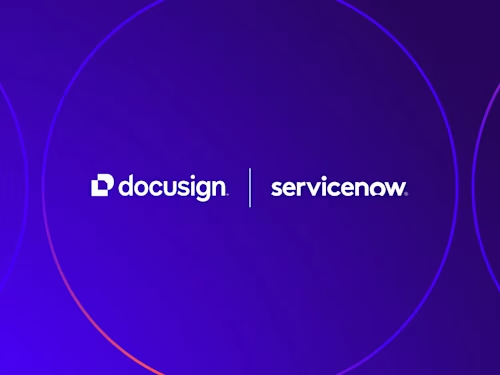
So verwenden Sie Docusign CLM mit ServiceNow
Integration von Docusign CLM in die ServiceNow-Plattform: Den kompletten Vertragsprozess beschleunigen und automatisieren, ohne Systeme wechseln zu müssen.

Verträge spielen bei nahezu jeder Geschäftsbeziehung eine zentrale Rolle, und an den meisten Vertragsprozessen sind oftmals mehrere Abteilungen beteiligt. Bei gängigen Verträgen wie Vertraulichkeitsvereinbarungen mit Lieferanten (NDAs), Rahmenverträgen für Dienstleistungen (MSAs) und Verträgen mit Drittanbietern arbeiten häufig mehrere Teams daran, Informationen aus dem Vertrag in andere Systeme zu übertragen, um damit verbundene Arbeitsabläufe wie das Onboarding eines Lieferanten in die Wege zu leiten. Die von den einzelnen Abteilungen verwendeten Systeme sind jedoch oft nicht miteinander verbunden. Das kann wertvolle Zeit kosten und zu Fehlern führen.
Rechts-, Beschaffungs-, Personal- und IT-Abteilungen nutzen ServiceNow, um verschiedene Anfragen einzureichen, zu genehmigen und auszuführen. Zu diesen Prozessen gehört zunehmend auch der Bedarf an Dokumentenerstellung, Zusammenarbeit und rechtlicher Genehmigung von Verträgen. Durch die Integration von Docusign CLM in die ServiceNow-Plattform können diese Teams den Vertragsprozess von Anfang bis Ende beschleunigen und automatisieren, ohne das System wechseln zu müssen.
Optimieren Sie ServiceNow Workflows mit Docusign CLM Spoke
Mit Docusign CLM Spoke können Kunden Vertragsabläufe und komplette Prozesse optimieren. Das spart Zeit und steigert die Produktivität ihrer Mitarbeiterinnen und Mitarbeiter. Docusign CLM Spoke ist ab sofort im ServiceNow Store verfügbar.
Starten Sie einen CLM-Workflow über die ServiceNow-Plattform. Übertragen Sie die Daten direkt von ServiceNow in CLM, um Dokumente und Verträge mit den korrekten Daten zu erstellen.
Fügen Sie Dokumente wie Verträge mit Dritten in ServiceNow direkt zu einem CLM-Workflow hinzu. Außerdem können Nutzerinnen und Nutzer ausgehandelte und abgeschlossene Dokumente aus CLM an ServiceNow zurücksenden.
Holen Sie Daten aus CLM in ServiceNow zurück für den Fall, dass sich Bedingungen während des Verhandlungsprozesses geändert haben und Sie Aktualisierungen in ServiceNow vornehmen müssen.
Überprüfen Sie den Status von Workflows in CLM und übertragen Sie den Auditverlauf aus CLM in ServiceNow.
So funktioniert Docusign CLM Spoke
Angenommen, das Beschaffungsteam möchte einen neuen Lieferanten einsetzen. Sobald die wichtigsten Informationen über den Lieferanten in ServiceNow eingegeben wurden, ist der erste Schritt die Unterzeichnung eines NDA durch den Lieferanten.
Der Beschaffungsmanager kann den NDA-Vertrag von ServiceNow aus anfordern und den richtigen Lieferanten auswählen. Da die Kontaktinformationen des Lieferanten bereits in ServiceNow vorhanden sind, erstellt Docusign CLM automatisch den NDA-Vertrag und füllt ihn mit den korrekten Lieferanteninformationen aus.
Docusign eSignature sendet dann das NDA an den Lieferanten zur Unterzeichnung. Sobald der Lieferant das NDA unterzeichnet, sieht der Beschaffungsmanager den aktualisierten Status in ServiceNow und das unterzeichnete NDA ist nun als Anhang verfügbar.
Erfahren Sie mehr über die Docusign und ServiceNow Integration und laden Sie sie im ServiceNow Store herunter.
ServiceNow, das ServiceNow-Logo, Now, die Now-Plattform und andere ServiceNow-Marken sind Marken und/oder eingetragene Marken von ServiceNow, Inc. in den Vereinigten Staaten und/oder anderen Ländern.
Ähnliche Beiträge
Docusign IAM ist die Vertragsplattform, die Ihr Unternehmen braucht



